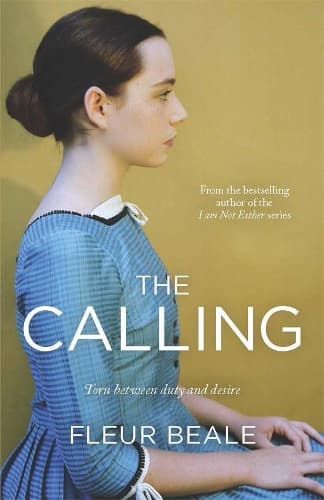Review: The Calling
Reviewed by Link Pickering
Multi-award winning, Wellington-based author Fleur Beale has crafted an inspiring tale of a young girl, Molly Conway, as she struggles with her faith in the face of many difficulties. Throughout the story, readers experience inner conflict, abuse and religious troubles, as seen through the life of Molly, while the integration of te reo along with the real-life roots of the story, makes this an absorbing and immersive read.
Molly, as a committed Catholic, wants to follow her mother’s dying wish for her to become a nun but her Methodist father wants her to marry. It means Molly struggles with her true calling and finds it difficult to know what to do with her life. We see her reduce domestic abuse and the value of her own life and decisions because of her religious worship. Looking to God for answers that she doesn’t receive instils doubt in Molly as she begins to discover other avenues for her life. After many realisations and opened doors, Molly is able to start along a path she feels is hers but not without hesitation.
The focus on religion, and the differing views of varying individuals, creates an opportunity for readers to learn. Even if you aren’t religious or aren’t interested in religion, I still recommend The Calling. The tale explores the power of religion over an individual as we see Molly endure much suffering due to her beliefs. Beale’s stories frequently include troubled adolescents and her novel I Am Not Esther, the first of a series published worldwide to great acclaim, also explores religious identity.
The internal struggles that Molly endures - between her own calling and her deceased mother’s wishes, between love and serving god, and between selflessness and selfishness - are relatable to young adults. Though her struggles may not reflect the conflicts of modern society’s young adults, it illustrates how people can learn to make their own choices and become independent. Her journey of hard decisions, growth and reflection make her a role model for young people struggling with their beliefs.
Indeed, Molly’s story reflects our contemporary society where people are often having to consider the expectations from those they look up to, compared to their own interests. Molly, like many of us, has to re-evaluate her beliefs, re-think lives and goals.
The concepts within the text make it better suited to more mature audiences, yet the language employed is more immature, compared to the topics it addresses. However, the easily comprehensible writing provides a pathway for younger audiences to develop an understanding of how religious beliefs develop and hold sway over an individual. I also found the blurb to be a misleading representation of the contents within the book. The serious tone of the summary does not accurately reflect the lighter tones within the narrative, which could drive away some broader audiences.
The Calling vividly depicts the Whanganui settlement of Jerusalem, recognised due to the charismatic nun, Mother Mary Joseph Aubert. She devoted her life and time to caring for others after arriving in Aotearoa New Zealand in 1860 and, among other things, setting up hospitals and creating a home for orphans. Beale was helping the sisters at the Home of Compassion in Wellington find material to send to Rome in their application to have Mother Mary Joseph Aubert considered for sainthood, when she was asked to write about Mother Aubert. This served as the inspiration for The Calling, which provides an original perspective of the impact of religion.
I admit I was hesitant to read this novel. As an avid fantasy reader, a story about religion based on real life people and events was vastly out of my range of preferred genres, but I gave it a go. I found that the short chapters and fast-paced storytelling made for an easy and gripping read. I recommend this novel to step out of your comfort zone and expand your genres when reading.
Reviewed by Link Pickering
